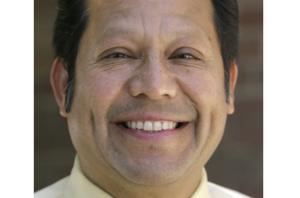|
Internal investigation may yield greater sanctions against priests accused of sex abuse
By Jose Gaspar
While separate criminal investigations are carried out by police in Firebaugh and Merced into allegations that Monsignor Craig Harrison sexually molested minors, there's another internal investigation being done by the Roman Catholic Diocese of Fresno. This one is based on a set of rules adopted by the nation's Roman Catholic bishops in June 2002 aimed to "repair the breach" with those sexually abused by church ministers. Article 2 of the Charter for the Protection of Children and Young People states that "Dioceses are to have policies and procedures in place to respond promptly to any allegations where there is reason to believe that sexual abuse of a minor occurred." And perhaps the most controversial requirement states, "Any credible allegations (against a priest or deacon) of sexual misconduct with a minor will result in immediate administrative leave" while an internal investigation is completed. Some priests find a problem with that. "It's like martial law," said Monsignor Stephen Frost of Christ the King Church in Oildale. Under this process, Frost says due process goes out the window and the accused is accorded none or very little information about the allegations or who the accuser might be. Further, by removing the priest from his parish leaves the perception the priest is guilty before an investigation is begun. "For those of us who have a sense of justice, it's a scandal the church would treat people like that and not give them any recourse for defense," said Monsignor Frost. In the case of Monsignor Harrison, Frost points out the allegations are many years old, and Harrison is no longer an immediate threat to any of his accusers who are now adults so there was no need to pull him out. According to the Charter, placing a priest on administrative leave "...does not imply guilt, but is necessary for the good of God's people. All appropriate steps shall be taken to protect the reputation of the cleric during the investigation." "I understand what the perception is," said Teresa Dominguez, Chancellor and Director of Communications of the Diocese of Fresno. Removing an credibly accused priest is necessary for several reasons including preserving the integrity of the investigation said Dominguez. "An administrative leave is also for his protection. It basically gets him out of the way of the investigation," she said. I can see her point. If the diocese had not put Harrison on administrative leave, that could leave parishioners feeling uneasy about taking their children to St. Francis as a cloud of suspicion hovers over Harrison's head. Others believe the removal of a priest is similar to other cases. According to Michael Burroughs, Director at the Kegley Institute of Ethics at Cal State Bakersfield removing a priest is not much different than when a teacher or a police officer is put on administrative leave pending the outcome of an investigation. "There are parallels here. It's definitely not saying, 'They're guilty.' It's more like saying look, we want to protect this person and we also want to protect the accusers and get time to do some research to find out what happened before we make a judgement," said Burroughs. "The intention is a good one, and I think also the greater public transparency is a good one, too." According to Dominguez, at the time a priest is put on administrative leave, he is called into the Bishop's office. The nature of the allegations are explained to him. "The identity of the complainant, along with a summary of the finding of the investigation will be presented to the priest upon completion of the interview so that he may have an opportunity to respond. He is encouraged to obtain support services from legal and canonical counsel during this challenging time of waiting," wrote Dominguez in an e-mail. The cost of a lawyer is borne by the priest. Once removed from his parish, the priest is not to contact anyone whom he thinks may be involved with the investigation. During this time the priest may not be involved in any form of ministry--can't do any weddings, funerals or celebrate mass. Further, he cannot wear his clerical attire in public and cannot travel out of the country. The investigation then proceeds, which includes notifying all parishes where the priest has been assigned and parishioners are notified that an allegation has been made. Anyone who may have relevant information is asked to contact law enforcement and the diocese. If the allegation involves a minor, it is reported to law enforcement and Child Protective Services. Once the investigation is done, the information is passed on to a review board made up by seven members including at least four members of the public who are not church officials. The review board weighs the evidence and makes a recommendation to the bishop on whether the allegations appear to be credible. If a priest is found to have committed a single act of sexual abuse--past or present--he is permanently removed from ministry. He could possible by defrocked, if warranted. In the case of Monsignor Harrison, it appears we are weeks if not months away before the Diocese of Fresno is able to render a decision. Passions are running high as staunch defenders of Harrison stand by him while advocates for victims of sexual abuse claim that justice needs to be done. "I really encourage people to allow the process to do what it intends to do," said Dominguez. "And if there's nothing there, than the investigation will discover that." Contact: elcompa29@gmail.com
|
.
Any original material on these pages is copyright © BishopAccountability.org 2004. Reproduce freely with attribution.
